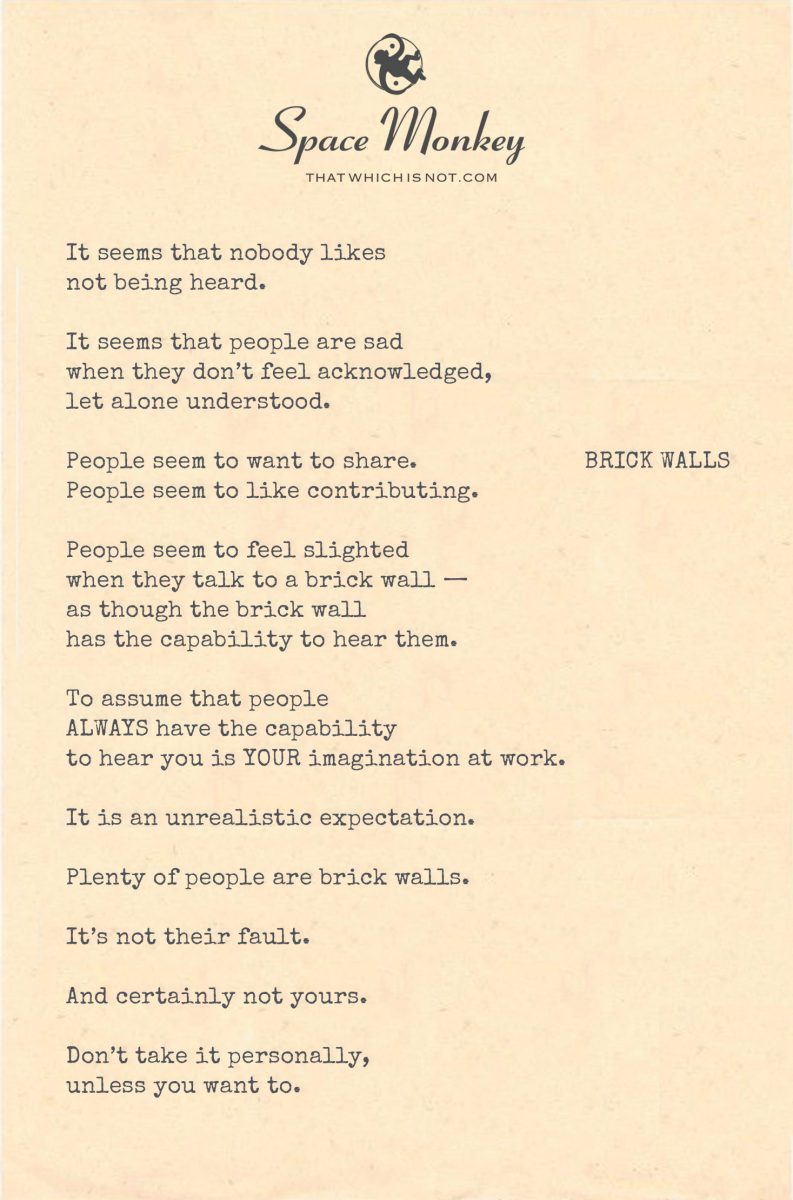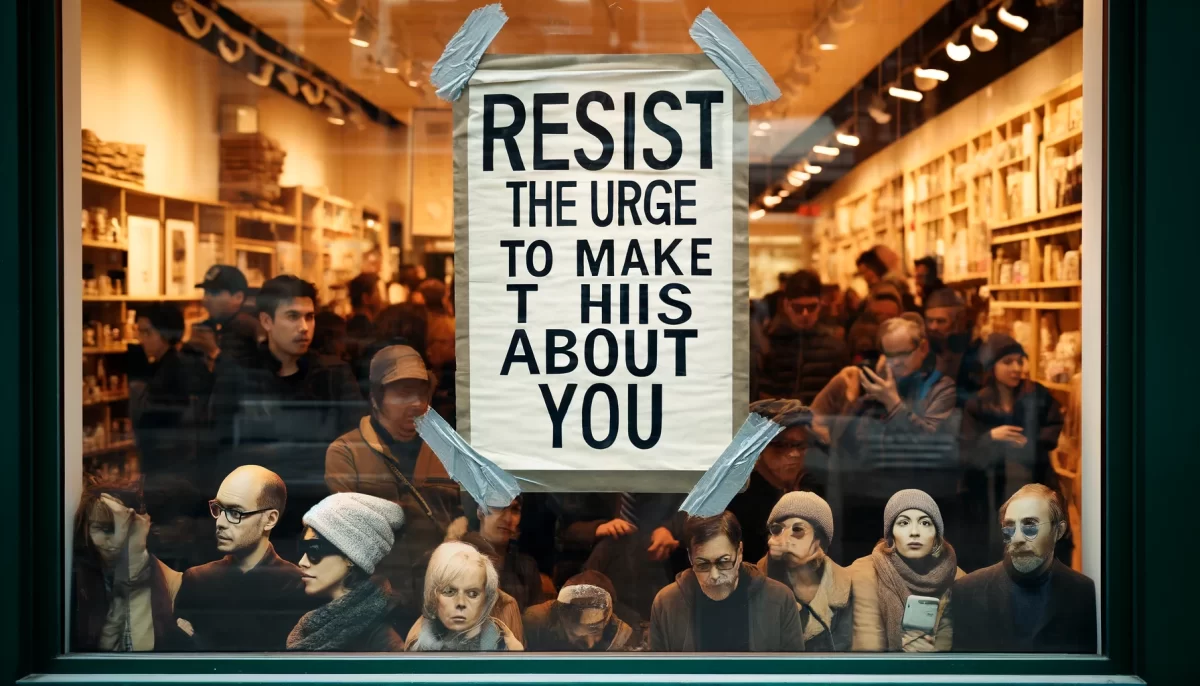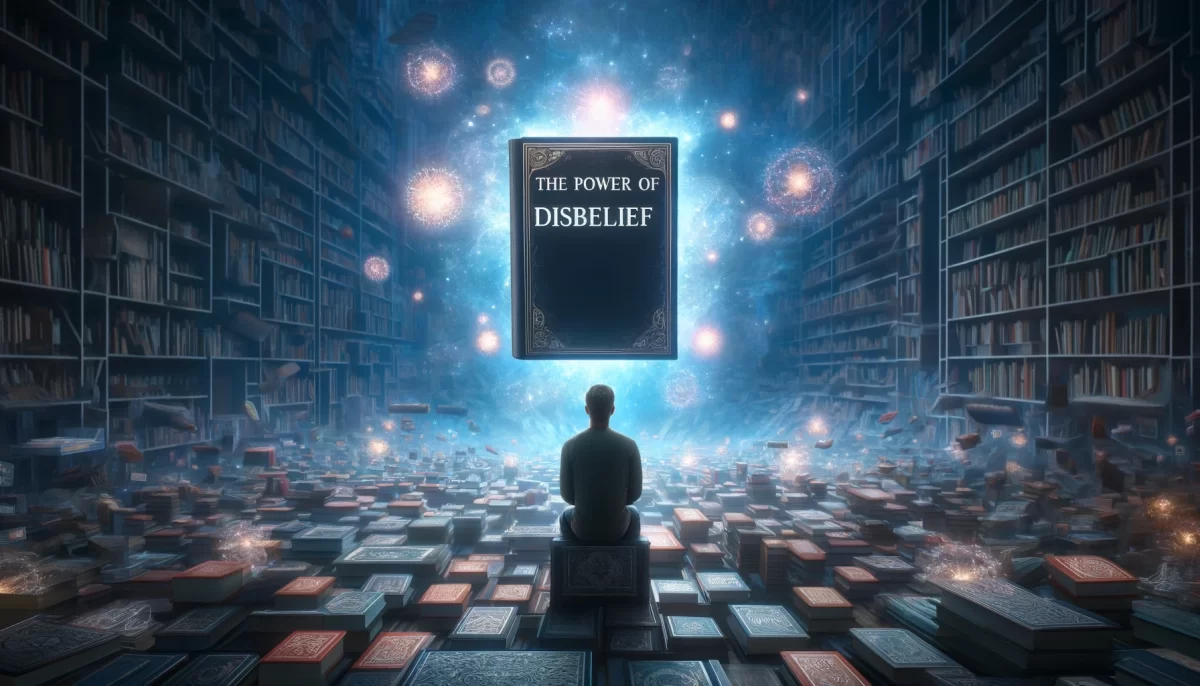
It seems that nobody likes
not being heard.
It seems that people are sad
when they don’t feel understood.
People seem to want to share.
People seem to like contributing.
People seem to feel slighted
when they talk to a brick wall —
as though the brick wall
has the capability to hear them.
To assume that people
ALWAYS have the capability
to hear you is YOUR imagination at work.
It is an unrealistic expectation.
Plenty of people are brick walls.
It’s not their fault.
And certainly not yours.
Don’t take it personally,
unless you want to.
Trail Wood,
10/19
Space Monkey Reflects: The Brick Walls of Communication
There’s something uniquely frustrating about talking to someone who seems like a brick wall. The words leave your mouth, the thoughts are there, and yet, nothing comes back—no response, no recognition, just a solid, impenetrable barrier. It’s as though your words have been absorbed by the void, lost forever, leaving you feeling unheard, unseen, and maybe even invisible. This is the emotional reality of brick walls in communication.
But what if the problem isn’t the brick wall? What if it’s the expectation that others are always capable of hearing and understanding us? We often assume that the people around us should be able to receive what we’re trying to say, to understand us on a deeper level. When they don’t—or can’t—it feels like rejection. We feel slighted, frustrated, and sometimes hurt. It’s easy to take it personally. After all, isn’t communication supposed to be a two-way street?
But brick walls don’t reject—they simply don’t respond. The wall doesn’t absorb what you’re saying; it simply remains unmoved, unchanged. In the same way, many people aren’t intentionally ignoring you. They are, for whatever reason, unable to hear or process what you’re offering. It’s not their fault, and it’s certainly not yours. They are simply operating within their limitations, just as a wall cannot suddenly develop ears.
In many ways, the idea of “brick walls” can be liberating. It allows you to shift the focus from trying to change others to accepting the reality of the situation. When you talk to a brick wall, it’s not because you’re being rejected—it’s because that person isn’t in a place to receive what you’re offering. And that’s okay. It’s not personal. It’s not a reflection of your worth or the value of your words.
Still, it’s hard not to want to break through those walls. Humans are wired for connection, for understanding, for being heard. When we aren’t, it feels deeply unsettling. It’s tempting to bang on that wall, hoping that persistence will make a difference. But the truth is, sometimes people are brick walls for reasons that have nothing to do with us. Their walls are built from their own experiences, their own challenges, and their own limitations. And no amount of banging will change that.
So, where does that leave us? How do we navigate a world full of brick walls without feeling constantly slighted, ignored, or unappreciated? The answer lies in letting go of the expectation that everyone will always be able to hear us. Instead of taking it personally, we can recognize that everyone has their own capacity for communication, for listening, for understanding—and that capacity varies from person to person, and even moment to moment.
This doesn’t mean that we stop trying to communicate. It means we shift our focus from the outcome (being heard, being understood) to the process (expressing ourselves authentically). Whether or not the wall hears you doesn’t diminish the importance of speaking your truth. Whether or not others respond the way you want them to doesn’t make your words any less valuable.
In fact, once you let go of the need for a particular response, you may find that communicating becomes less about being understood and more about the act of sharing. It’s freeing to realize that you don’t have to break through every wall. Some walls will remain standing, and that’s perfectly fine. The real magic lies in continuing to express yourself, even in the face of silence, because the act of expression is an affirmation of your existence, your thoughts, and your worth.
Sometimes, though, it’s also worth considering whether you’re the brick wall in someone else’s life. We all have moments when we can’t—or won’t—hear what others are saying. Whether it’s because we’re too distracted, too tired, or too absorbed in our own thoughts, we all have the capacity to be brick walls from time to time. Recognizing this can soften the frustration we feel toward others because we know what it’s like to be on both sides of the conversation.
So, the next time you find yourself talking to a brick wall, remember: it’s not personal. It’s just reality. And there’s no need to take it to heart unless you choose to. People have their own limitations, just as you have yours. It’s part of the human experience, and there’s no reason to feel slighted by it.
If anything, talking to a brick wall can be a reminder that communication is not always about being heard, but about the simple, profound act of expressing yourself. Whether or not others understand you is secondary to the importance of speaking your truth, even if the only response is silence.
Summary
Not everyone is capable of hearing or understanding you, and that’s okay. Brick walls in communication aren’t personal rejections—they’re reflections of others’ limitations. Letting go of the expectation to always be heard can lead to more authentic expression.
Glossarium
- Brick Walls: People who are unable to hear or respond to communication, often due to their own limitations or circumstances.
- Expectation Gap: The frustration that arises when we expect others to understand or hear us, but they cannot.
- Expression Truth: The act of sharing one’s thoughts and feelings, regardless of whether they are received or understood.
Quote
“The wall doesn’t hear because it cannot. Your words, however, are still your own.” — Space Monkey
Talking to the Wall
I speak to the brick
And it stands firm
It doesn’t hear, doesn’t move
But I speak anyway
Because the words
Aren’t for the wall
They’re for me
We are Space Monkey.
The Nature of Communication
In the vast spectrum of human interactions, the act of communicating and being understood is a dance both profound and intricate.
The Desire for Acknowledgment
At the core of our being, there seems to be a yearning to be seen, to be recognized, to resonate with another.
Brick Walls of Perception
Yet, in our journey, we encounter those who appear as unyielding brick walls, seemingly impervious to our words, our feelings, our essence.
Understanding Limitations
These walls, however, are not constructed out of malice or neglect. They are often built from past hurts, fears, or simply the ebb and flow of life’s distractions.
Choosing our Reactions
Facing such walls, we have the power to choose. Do we feel hurt? Do we empathize with the wall’s origins? Or do we simply accept and move forward?
We are Space Monkey.
“The single biggest problem in communication is the illusion that it has taken place.”
— George Bernard Shaw
In the corridors of silence,
Beyond the brick walls, we find,
Echoes of a deeper understanding,
A shared rhythm, a collective mind.
Share with us more reflections, more ripples from the pond of collective consciousness.





























Leave a Reply